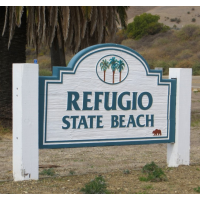Environmentalists Protest Brown’s Coastal Act Suspension After Santa Barbara Oil Spill

When Governor Jerry Brown declared a state of emergency in Santa Barbara on May 20 following the disastrous Refugio State Beach oil spill, he gave several government agencies specific instructions on how to help.
He directed the Department of Fish and Wildlife (DFW) and the Office of Spill Prevention and Response (OSPR) “to clean up and mitigate the impacts of the oil spill and to hold the responsible parties accountable for the cleanup and mitigation of the environmental and fiscal impacts of the oil spill.”
Brown told the California Conservation Corps, the Department of Forestry and Fire Protection, and CaliforniaVolunteers to coordinate with the Office of Emergency Services and OSPR to mobilize volunteers and “utilize all available resources to support the response, cleanup and mitigation.”
And he told the California Coastal Commission to suspend its environmental protection activities.
That last one elicited a howl from more than two dozen environmental groups, who sent a letter (pdf) to the governor this week protesting his decision:
“The damage that has occurred to date is unacceptable—more than 40 miles of the coast fouled with oil, at least 80 dead birds and 45 dead marine mammals, two popular State Parks closed and 138 square miles closed to fishing. Now is the time when we need the greatest possible protections for the coastal environment, not a weakening of California’s signature coastal protection law.”
Brown’s declaration suspended Chapter 7 of the Coastal Act, which provides important protections for sensitive habitat areas, wetlands and marine resources. The environmentalists argued that was unnecessary, because the Act already recognizes the need to be more flexible in an emergency.
The letter’s signatories acknowledged that other agencies at the state and local level have laws and regulations they can use to deal with the spill aftermath, but said it wouldn’t be the same because, “They do not share the same substantive policies of the Coastal Act, and no other agencies have the legal authority to enforce the requirements of the Act.”
The environmentalists fear that future efforts to enforce coastal mitigation and restoration development permits by Santa Barbara County could be endangered if Brown does not immediately rescind his order to suspend Chapter 7.
While groups such as the Environmental Defense Center, the Natural Resources Defense Council, Surfrider Foundation, Heal the Bay, Santa Barbara Channelkeeper and Sierra Club California are asking that the governor not make it easier for Plains All American Pipeline (PAAP) of Texas to avoid responsibility for spilling 105,000 gallons of oil into the ocean, others are going to court.
Lawyers on behalf of fisherman Stace Cheverez filed a lawsuit (pdf) against Plains in the U.S. District Court Central District of California seeking class-action status for claiming damages from the spill. The suit contends that the disaster could have been averted if the oil company had installed an automatic shutoff valve that every other major pipeline in the county has.
“When Defendant, through its predecessor in interest, built the pipeline in 1987, Santa Barbara County demanded that it install such a shut-off system and allow the County to inspect the welds on the pipeline,” the lawsuit states.
That didn’t happen. Plains argued that the county lacked jurisdiction to make such demands, sued and won.
Federal regulators said on Wednesday that a preliminary investigation of the 10.6-mile pipeline found “extensive” corrosion and a six-inch gash where the oil gushed out. The report (pdf) from the U.S. Department of Transportation’s Office of Pipeline Safety in the Pipeline and Hazardous Materials Safety Administration revealed a 45% loss of metal thickness where the leak occurred.
The lawsuit also contends that Plains was slow to react to indications of pipeline failure and appears not have promptly notified government agencies of the unfolding problem. Consequently, ongoing grave harm is being done to recreational, commercial and environmental interests. Some of the harm is already evident, but a lot is not:
“There, as the oil sinks and swirls in the tides and currents, it is likely suffocating sea grass, clinging to kelp beds, smothering reefs, and otherwise seeping into the aquatic food chain through shellfish and plankton. Dead bass, lobsters, crabs, octopi and other species that live beneath the surface offshore have already begun washing up on area beaches.”
Plaintiff Cheverez is an urchin diver and nearshore fisherman who owns and operates two boats out of the Santa Barbara marina. He would normally be fishing in areas presently closed. It is unclear when he will be allowed back into the 138-square-mile zone.
–Ken Broder
To Learn More:
Enviros Decry Brown’s Coastal Act Suspension (Calbuzz)
Santa Barbara Oil Spill Blamed on Texas Company's Neglect (by Rebekah Kearn, Courthouse News Service)
Santa Barbara Fisherman Files Suit Against Oil Pipeline Company (by Javier Panzar, Los Angeles Times)
Preliminary Report: Pipeline That Spilled Oil on Central California Coast Was Badly Corroded (by Michael R. Blood, Associated Press)
Santa Barbara Oil Spill Fits Nicely on Company’s List of Safety Problems (by Ken Broder, AllGov California)
Oil Spill from a Pipeline near Santa Barbara Coats the Shoreline (by Ken Broder, AllGov California)
Stace Cheverez et al v. Plains All American Pipeline LP (U.S. District Court Central District of California) (pdf)
- Top Stories
- Controversies
- Where is the Money Going?
- California and the Nation
- Appointments and Resignations
- Unusual News
- Latest News
- California Forbids U.S. Immigration Agents from Pretending to be Police
- California Lawmakers Urged to Strip “Self-Dealing” Tax Board of Its Duties
- Big Oil’s Grip on California
- Santa Cruz Police See Homeland Security Betrayal in Use of Gang Roundup as Cover for Immigration Raid
- Oil Companies Face Deadline to Stop Polluting California Groundwater





